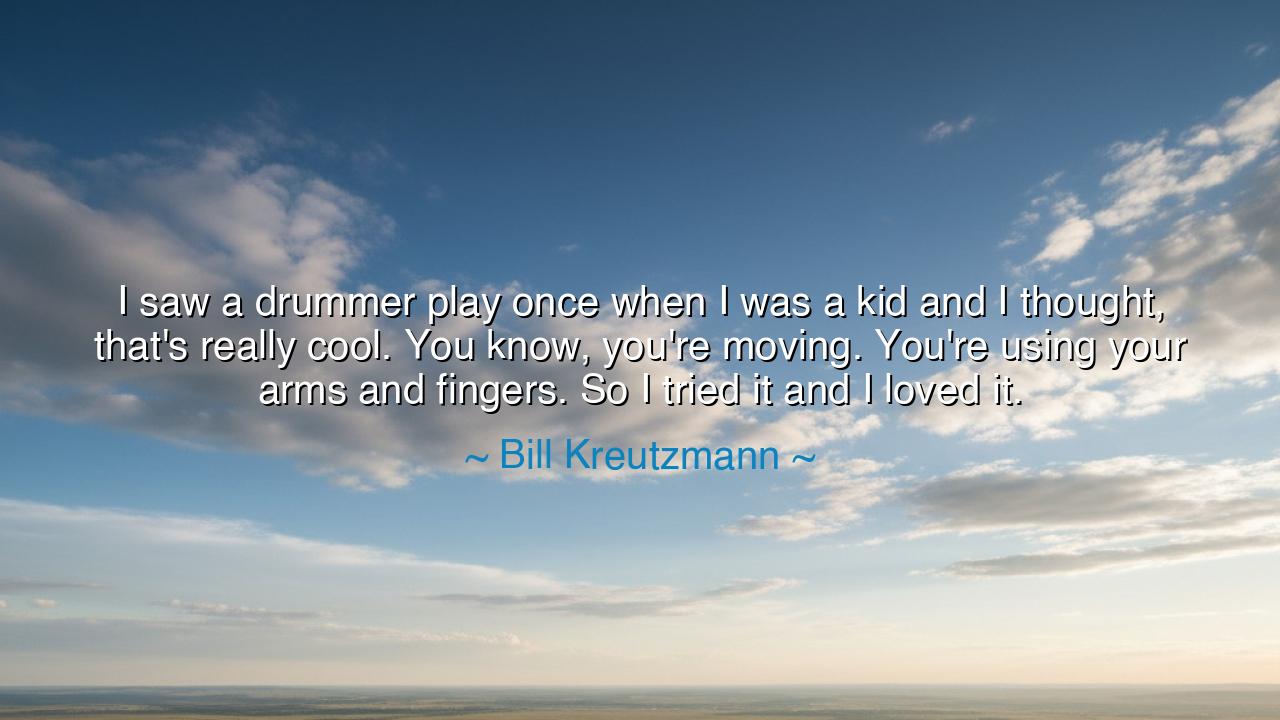
I saw a drummer play once when I was a kid and I thought, that's
I saw a drummer play once when I was a kid and I thought, that's really cool. You know, you're moving. You're using your arms and fingers. So I tried it and I loved it.






"I saw a drummer play once when I was a kid and I thought, that's really cool. You know, you're moving. You're using your arms and fingers. So I tried it and I loved it." These words from Bill Kreutzmann capture the magic of inspiration and the profound way in which our early experiences can shape our path in life. As a child, Kreutzmann was drawn to the rhythm of the drums, captivated by the movement and the energy that seemed to flow through the drummer’s body. It was in that moment that he discovered not only the joy of making music, but the power of self-expression. The rhythm of the drums became a symbol of connection—between body and sound, between passion and creativity—and in that moment, Kreutzmann found his calling.
In the ancient world, the art of drumming was often seen as a sacred act, a way to connect to the divine and to the rhythm of the cosmos. The Greeks, in their great celebrations and rituals, often used the drum to mark the passage of time, to signal the arrival of the divine, or to stir the hearts of warriors before battle. The ancient poet Pindar wrote of the power of music to move the soul, and the rhythmic beat of the drum was one of the most primal expressions of this power. Much like Kreutzmann’s experience, the ancient world recognized that the act of drumming could ignite a connection not only to the physical world but to a deeper spiritual energy—a force that called the body into motion and the soul into expression.
In a similar vein, King David of the Bible was known for playing the harp and for dancing before the Ark of the Covenant. The act of dancing and playing music was seen not just as entertainment, but as a way of expressing joy, gratitude, and a deep connection to the divine will. In his exuberance, David embodied the ancient belief that music is a channel through which the human spirit can be uplifted and made whole. Like Kreutzmann, David’s understanding of movement through music was not merely a physical act; it was a spiritual one, where every beat and note aligned the body with the divine rhythm of the universe. Music was a conduit for greater truths—and the drum, with its steady, unwavering pulse, was a means of anchoring oneself to the larger, eternal cycle of life.
In the case of Bill Kreutzmann, the drum was not just a tool for music; it became an instrument of self-discovery. His love for the drums grew from an initial curiosity, just as the great Greek philosopher Socrates believed that learning begins with a sense of wonder and an openness to what the world can offer. Socrates taught that through engagement with the world, whether through philosophy, art, or music, the individual learns about themselves and their place in the larger world. Kreutzmann’s attraction to the drums was not merely about the physical act of playing, but about discovering a medium through which he could express his inner rhythms, his emotions, and his very being. It was the beginning of a lifelong journey of personal and artistic growth, much like the philosophers' quest for knowledge.
Similarly, consider the life of Ludwig van Beethoven, whose music transcended mere sound to become a language of the soul. Beethoven’s early years were marked by difficulty and struggle, but it was through music—a deep, primal connection to the rhythms of life—that he found his path. His passion for creating music, even when deafness overtook him, mirrors Kreutzmann’s dedication to the drums. For Beethoven, as for Kreutzmann, music became a form of resilience, a way to find meaning and beauty in a chaotic world. It is through the act of creating, whether on the stage or in the studio, that one becomes connected not just to the present, but to the eternal rhythm of existence. Beethoven’s music, like the drums Kreutzmann first encountered, speaks to the innate human need to find harmony amidst dissonance, to make something meaningful from the raw energy of life.
The lesson we can take from Kreutzmann’s reflection is one of openness and courage. His willingness to explore a new avenue of expression as a child led him to a career that not only defined his life but also touched countless others. Just as Kreutzmann discovered that the act of playing music could open new realms of expression, we too must be open to the possibility that the paths we stumble upon may reveal hidden passions and talents. The lesson is clear: the simple moments of curiosity often hold the potential to transform our lives. Like the ancients, we must remain open to the rhythms of the world, allowing them to guide us on our journey.
In practical terms, the challenge is to be present with what moves us. Just as Kreutzmann was drawn to the drums and followed that call with dedication, we too must listen to the call of our own passions. Whether it is through music, art, or any other form of self-expression, we must remain open to the unknown and trust that, like Kreutzmann, we can find a place where our gifts can flourish. Embrace what excites you, what makes you feel alive, and explore it with the curiosity and dedication of a child. As we do so, we allow the rhythms of the universe to enter us, and in turn, we find our own unique voice in the symphony of life.






AAdministratorAdministrator
Welcome, honored guests. Please leave a comment, we will respond soon